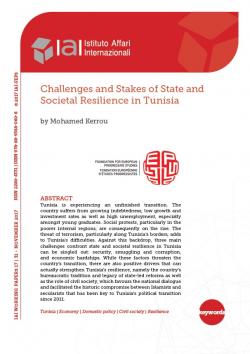Challenges and Stakes of State and Societal Resilience in Tunisia
Tunisia is experiencing an unfinished transition. The country suffers from growing indebtedness, low growth and investment rates as well as high unemployment, especially amongst young graduates. Social protests, particularly in the poorer internal regions, are consequently on the rise. The threat of terrorism, particularly along Tunisia’s borders, adds to Tunisia’s difficulties. Against this backdrop, three main challenges confront state and societal resilience in Tunisia can be singled out: security, smuggling and corruption, and economic hardships. While these factors threaten the country’s transition, there are also positive drivers that can actually strengthen Tunisia’s resilience, namely the country’s bureaucratic tradition and legacy of state-led reforms as well as the role of civil society, which favours the national dialogue and facilitated the historic compromise between Islamists and secularists that has been key to Tunisia’s political transition since 2011.
Paper produced in the framework of a project entitled “The EU’s New Resilience Agenda in the MENA Region”, November 2017.
-
Details
Roma, IAI, November 2017, 21 p. -
Issue
17|31 -
ISBN/ISSN/DOI:
978-88-9368-060-8
Introduction
1. Challenges to state and societal resilience
1.1 The security challenge linked to terrorism and national security
1.2 The political challenges of smuggling and corruption
1.3 Social protest movements for employment and development
2. Facilitators for state and societal resilience
2.1 The centralized bureaucratic tradition
2.2 Social reforms and the state reformist tradition
2.3 Civil society, national dialogue and the historical compromise between Islamists and secularists
Conclusion
References
Topic
Tag
Related content
-
Publication16/02/2018
The EU, Resilience and the MENA Region
leggi tutto -
Ricerca30/10/2017
The EU’s New Resilience Agenda in the MENA Region
leggi tutto



